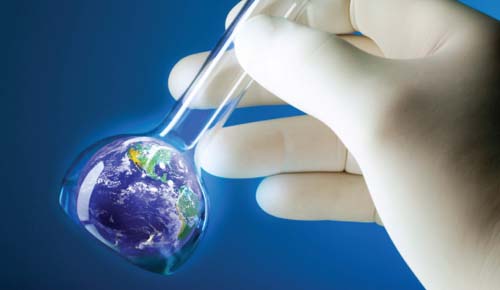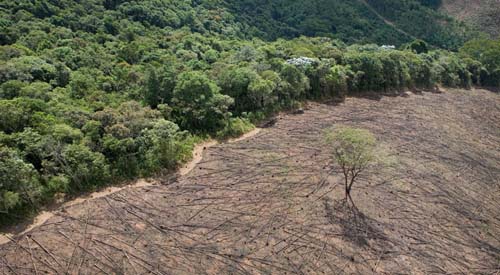
Time for humankind to start healing the planet
Andrew Hammond
As final preparations were made for World Environment Day, the Earth is facing a triple emergency.
While pollution poisons much of our air, land and water, we are also discovering that habitat loss and other related pressures mean an estimated 1 million species are threatened with extinction.
Yet, as important as these twin challenges are, perhaps the single biggest environmental problem is global warming, as the climate is heating up too quickly for people and nature to adapt to. It is the climate challenge that will be the focus of the UN’s Bonn climate conference, which starts on Monday after preparatory meetings this week, only half a year after COP26 in Glasgow.
As will be discussed in western Germany, the good news is that the climate-related solutions and technology already exist and are increasingly affordable. However, the needed collective, transformative action is being held back, including by the impact of the Ukraine war.
That conflict has seen a significant shift, especially in Europe, around the concept of energy security. This reflects the deep dependence that much of the continent has on Russian supplies of fossil fuels. In May, the EU announced both a partial oil embargo and a new energy plan to try to tackle this.
Ahead of UN climate conference in Bonn, the needed collective, transformative action is being held back
The oil embargo agreed on Tuesday will see about 90 percent of Russian oil banned by the end of the year. This was agreed only two weeks after the EU had set out a new “RepowerEU” energy plan with a headline goal of aiming to cut Russian gas out of the European energy equation before 2027, and by two-thirds before the end of 2022.

The European Commission claims 95 percent of the plan’s €300 billion ($320 billion) in financing will go into the energy transition, speeding up the Green New Deal, including €86 billion for renewables and €27 billion for green hydrogen infrastructure. However, it will also enable dozens of big new fossil fuel infrastructure projects.
Critics of this, including the UK’s COP26 President Alok Sharma, are worried the European Commission may be substituting dependence on Russian oil and gas with imports from other countries by investing billions in, for instance, gas import terminals in Germany, Finland and the Netherlands, as well as pipelines in Croatia, Poland, Greece, Spain and Italy. The bloc is enabling increased natural gas purchases from nations like the US, Egypt, Israel and the Gulf states, producing more biomethane and having coal plants run longer hours.
It is in this context — and the world’s failure to so far meet the delivery timetable on cutting carbon dioxide emissions set out in Paris in 2015 — that the Bonn conference meets. The UN will once again make clear that only urgent, unprecedented action can avoid worsening risks of drought, extreme heat and floods across the globe.
So, the scale of the challenge is huge and growing. Actions that are affordable and feasible need to be taken collectively by governments, businesses and individuals as the world seeks to turn this situation around under the terms of the flexible 2015 Paris treaty, which has the potential to be ratcheted up.
The challenge is keeping temperature rises to no more than the mark of 1.5 degrees Celsius above pre-industrial levels, as set out by the Paris agreement. But the UN warns that there is now a very high risk that, under current emissions trajectories and national pledges, global warming will significantly exceed that amount.
While the difference between a 1.5 C degree rise and higher may seem inconsequential to some, the difference is profound, according to the UN. For instance, the portion of the global population subject to water stress could be 50 percent lower with overall warming of 1.5 C compared to 2 C. Meanwhile, a forecast 99 percent of corals could be lost at 2 C compared to perhaps 10 percent at 1.5 C.
What is now needed is proactive, concerted global action, starting in the second half of 2022, and the roadmap for moving forward is already clear. Firstly, implementation of the Paris deal will be most effective through national laws, where politically feasible, as legislation is difficult to roll back.
While the 2015 pledges made in Paris are not yet enough, the treaty put in place the domestic legal frameworks that are crucial building blocks to measure, report, verify and manage greenhouse gas emissions. In the future, the ambition must be that these frameworks are replicated in even more countries and are progressively ratcheted up.
As World Environment Day approaches, we must double down on transforming our economies and societies to make them more inclusive, fair and connected with nature, shifting from harming the planet to healing it. There may still be time if we act now to help co-create and implement, with governments, businesses and other organizations, what could become the cornerstone of sustainable development, with the implementation of the Paris Agreement at its heart.
The writer is an Associate at LSE IDEAS at the London School of Economics
